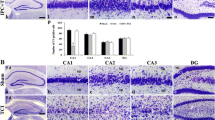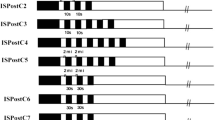Abstract
Ischemic preconditioning (IPC) has been demonstrated to provide a neuroprotection against brain damage produced by focal cerebral ischemia. However, it is elusive whether ischemic preconditioning attenuates ischemic brain damage through modulating phosphatidylinositol 3-kinase/Akt (PI3K/Akt) and extracellular signal-regulated kinase 1/2 (ERK1/2) signaling pathway. In the present study, we first explored the best scheme of repetitive ischemic preconditioning (RIPC) to protect rat brain against ischemic damage and then further investigated the underlying mechanisms in RIPC’s neuroprotection. Adult male Sprague-Dawley rats underwent ischemic preconditioning or (and) middle cerebral artery occlusion (MCAO). LY294002 or (and) PD98059 were injected intracerebroventricularly to selectively inhibit the activation of PI3K/Akt or ERK1/2. Neurological deficit scores, cerebral infarct volume, and morphological characteristic were detected at corresponding time after cerebral ischemia. The enzymatic activity of myeloperoxidase (MPO) was measured 24 h after cerebral ischemia. Expressions of p-Akt, t-Akt, p-ERK1/2, t-ERK1/2, nuclear factor-kappa B (NF-κB) p65, and cyclooxygenase-2 (COX-2) in ischemic brain were determined by Western blot. The release of tumor necrosis factor-α (TNF-α) in blood was examined by ELISA. In the various schemes of RIPC, IPC2 × 5 min causes less neuronal damage in the cortex and subcortex of ischemic brain and provides an obvious alleviation of cerebral infarction and neurological deficit after lethal ischemia. IPC2 × 5 min significantly reduces cerebral infarct volume, neurological deficit scores, and MPO activity; all of which were diminished by LY294002 or (and) PD98059. IPC2 × 5 min significantly upregulates the expressions of p-Akt and p-ERK1/2, which were inhibited by LY294002 or (and) PD98059. IPC2 × 5 min significantly downregulates the expressions of NF-κB p65 and COX-2 and attenuates the release of TNF-α; all of which were abolished by LY294002 or (and) PD98059. IPC2 × 5 min is the best scheme of RIPC to protect rat brain against cerebral ischemia. IPC2 × 5 min attenuates brain damage in rats subjected to lethal ischemia, and this neuroprotection is associated with inhibition of neuroinflammation through modulating PI3K/Akt and ERK1/2 signaling pathway.










Similar content being viewed by others
Abbreviations
- AIS:
-
Acute ischemic stroke
- BBB:
-
Blood-brain barrier
- COX-2:
-
Cyclooxygenase-2
- DMSO:
-
Dimethyl sulfoxide
- ELISA:
-
Enzyme-linked immunosorbent assay
- ERK1/2:
-
Extracellular signal-regulated kinase 1/2
- HE:
-
Hematoxylin and eosin
- ICV:
-
Intracerebroventricular
- IPC:
-
Ischemic preconditioning
- MCAO:
-
Middle cerebral artery occlusion
- MMP-9:
-
Matrix metalloproteinase-9
- MPO:
-
Myeloperoxidase
- NF-κB:
-
Nuclear factor-kappa B
- NT:
-
Neuroprotective therapy
- PI3K/Akt:
-
Phosphatidylinositol 3-kinase/Akt
- RIPC:
-
Repetitive ischemic preconditioning
- TNF-α:
-
Tumor necrosis factor-α
- t-PA:
-
Tissue-plasminogen activator
- TT:
-
Thrombolytic therapy
- TTC:
-
2,3,5-Triphenyltetrazolium chloride
References
Aksöyek S, Cinel I, Avlan D, Cinel L, Oztürk C, Gürbüz P, Nayci A, Oral U (2002) Intestinal ischemic preconditioning protects the intestine and reduces bacterial translocation. Shock 18(5):476–480
Autheman D, Sheldon RA, Chaudhuri N, von Arx S, Siegenthaler C, Ferriero DM, Christen S (2012) Glutathione peroxidase overexpression causes aberrant ERK activation in neonatal mouse cortex after hypoxic preconditioning. Pediatr Res 72(6):568–575
Bederson JB, Pitts LH, Tsuji M, Nishimura MC, Davis RL, Bartkowski H (1986) Rat middle cerebral artery occlusion: evaluation of the model and development of a neurologic examination. Stroke 17(3):472–476
Bhuiyan MI, Jung SY, Kim HJ, Lee YS, Jin C (2011) Major role of the PI3K/Akt pathway in ischemic tolerance induced by sublethal oxygen-glucose deprivation in cortical neurons in vitro. Arch Pharm Res 34(6):1023–1034
Bowen KK, Naylor M, Vemuganti R (2006) Prevention of inflammation is a mechanism of preconditioning-induced neuroprotection against focal cerebral ischemia. Neurochem Int 49(2):127–135
Chavez JC, Hurko O, Barone FC, Feuerstein GZ (2009) Pharmacologic interventions for stroke: looking beyond the thrombolysis time window into the penumbra with biomarkers, not a stopwatch. Stroke 40(10):e558–e563
Chen X, Liu X, Wan X, Wu Y, Chen Y, Cao C (2009) Ischemic preconditioning attenuates renal ischemia-reperfusion injury by inhibiting activation of IKKbeta and inflammatory response. Am J Nephrol 30(3):287–294
Cuartero MI, Ballesteros I, Moraga A, Nombela F, Vivancos J, Hamilton JA, Corbí ÁL, Lizasoain I, Moro MA (2013) N2 neutrophils, novel players in brain inflammation after stroke: modulation by the PPARγ agonist rosiglitazone. Stroke 44:3498–3508
del Zoppo GJ (2010) Acute anti-inflammatory approaches to ischemic stroke. Ann N Y Acad Sci 1207:143–148
Dong L, Qiao H, Zhang X, Zhang X, Wang C, Wang L, Cui L, Zhao J, Xing Y, Li Y, Liu Z, Zhu C (2013) Parthenolide is neuroprotective in rat experimental stroke model: downregulating NF-κB, phospho-p38MAPK, and caspase-1 and ameliorating BBB permeability. Mediat Inflamm 2013:370804
Durukan A, Tatlisumak T (2007) Acute ischemic stroke: overview of major experimental rodent models, pathophysiology, and therapy of focal cerebral ischemia. Pharmacol Biochem Behav 87(1):179–197
Fisher M, Albers GW (2013) Advanced imaging to extend the therapeutic time window of acute ischemic stroke. Ann Neurol 73(1):4–9
Gao X, Zhang H, Steinberg G, Zhao H (2010) The Akt pathway is involved in rapid ischemic tolerance in focal ischemia in rats. Transl Stroke Res 1(3):202–209
Hacke W, Kaste M, Bluhmki E, Brozman M, Dávalos A, Guidetti D, Larrue V, Lees KR, Medeghri Z, Machnig T, Schneider D, von Kummer R, Wahlgren N, Toni D (2008) Thrombolysis with alteplase 3 to 4.5 hours after acute ischemic stroke. N Engl J Med 359(26):1317–1329
Jones NM, Bergeron M (2004) Hypoxia-induced ischemic tolerance in neonatal rat brain involves enhanced ERK1/2 signaling. J Neurochem 89(1):157–167
Kilic E, Kilic U, Soliz J, Bassetti CL, Gassmann M, Hermann DM (2005) Brain-derived erythropoietin protects from focal cerebral ischemia by dual activation of ERK-1/-2 and Akt pathways. FASEB J 19(14):2026–2028
Kinsey GR, Huang L, Vergis AL, Li L, Okusa MD (2010) Regulatory T cells contribute to the protective effect of ischemic preconditioning in the kidney. Kidney Int 77(9):771–780
Kleindorfer D, Lindsell CJ, Brass L, Koroshetz W, Broderick JP (2008) National US estimates of recombinant tissue plasminogen activator use: ICD-9 codes substantially underestimate. Stroke 39(3):924–928
Lee JC, Kim IH, Cho GS, Park JH, Ahn JH, Yan BC, Kwon HM, Kim YM, Cheon SH, Cho JH, Lee HY, Won MH, Seo JY (2014) Ischemic preconditioning-induced neuroprotection against transient cerebral ischemic damage via attenuating ubiquitin aggregation. J Neurol Sci 336(1–2):74–82
Liesz A, Zhou W, Na SY, Hämmerling GJ, Garbi N, Karcher S, Mracsko E, Backs J, Rivest S, Veltkamp R (2013) Boosting regulatory T cells limits neuroinflammation in permanent cortical stroke. J Neurosci 33(44):17350–17362
Lin TN, He YY, Wu G, Khan M, Hsu CY (1993) Effect of brain edema on infarct volume in a focal cerebral ischemia model in rats. Stroke 24(1):117–121
Mansour Z, Charles AL, Bouitbir J, Pottecher J, Kindo M, Mazzucotelli JP, Zoll J, Geny B (2012) Remote and local ischemic postconditioning further impaired skeletal muscle mitochondrial function after ischemia-reperfusion. J Vasc Surg 56(3):774–82.e1
Prasad SS, Russell M, Nowakowska M (2011) Neuroprotection induced in vitro by ischemic preconditioning and postconditioning: modulation of apoptosis and PI3K-Akt pathways. J Mol Neurosci 43(3):428–442
Romanque P, Díaz A, Tapia G, Uribe-Echevarría S, Videla LA, Fernandez V (2010) Delayed ischemic preconditioning protects against liver ischemia-reperfusion injury in vivo. Transplant Proc 42(5):1569–1575
Shi SS, Yang WZ, Tu XK, Wang CH, Chen CM, Chen Y (2013) 5-Lipoxygenase inhibitor zileuton inhibits neuronal apoptosis following focal cerebral ischemia. Inflammation 36(6):1209–1217
Sirén AL, Fratelli M, Brines M, Goemans C, Casagrande S, Lewczuk P, Keenan S, Gleiter C, Pasquali C, Capobianco A, Mennini T, Heumann R, Cerami A, Ehrenreich H, Ghezzi P (2001) Erythropoietin prevents neuronal apoptosis after cerebral ischemia and metabolic stress. Proc Natl Acad Sci U S A 98(7):4044–4049
Smith WS (2004) Pathophysiology of focal cerebral ischemia: a therapeutic perspective. J Vasc Interv Radiol 15(1 Pt 2):S3–S12
Sommer C (2008) Ischemic preconditioning: postischemic structural changes in the brain. J Neuropathol Exp Neurol 67(2):85–92
Thompson JW, Narayanan SV, Perez-Pinzon MA (2012) Redox signaling pathways involved in neuronal ischemic preconditioning. Curr Neuropharmacol 10(4):354–369
Thompson JW, Dave KR, Young JI, Perez-Pinzon MA (2013) Ischemic preconditioning alters the epigenetic profile of the brain from ischemic intolerance to ischemic tolerance. Neurotherapeutics 10(4):789–797
Tu XK, Yang WZ, Shi SS, Wang CH, Chen CM (2009) Neuroprotective effect of baicalin in a rat model of permanent focal cerebral ischemia. Neurochem Res 34(9):1626–1634
Tu XK, Yang WZ, Wang CH, Shi SS, Zhang YL, Chen CM, Yang YK, Jin CD, Wen S (2010a) Zileuton reduces inflammatory reaction and brain damage following permanent cerebral ischemia in rats. Inflammation 33(5):344–352
Tu XK, Yang WZ, Shi SS, Wang CH, Zhang GL, Ni TR, Chen CM, Wang R, Jia JW, Song QM (2010b) Spatio-temporal distribution of inflammatory reaction and expression of TLR2/4 signaling pathway in rat brain following permanent focal cerebral ischemia. Neurochem Res 35(8):1147–1155
Tu XK, Yang WZ, Shi SS, Chen Y, Wang CH, Chen CM, Chen Z (2011) Baicalin inhibits TLR2/4 signaling pathway in rat brain following permanent cerebral ischemia. Inflammation 34(5):463–470
Wang Z, Zhang H, Xu X, Shi H, Yu X, Wang X, Yan Y, Fu X, Hu H, Li X, Xiao J (2012) bFGF inhibits ER stress induced by ischemic oxidative injury via activation of the PI3K/Akt and ERK1/2 pathways. Toxicol Lett 212(2):137–146
Warzecha Z, Dembiński A, Ceranowicz P, Dembiński M, Cieszkowski J, Kuśnierz-Cabala B, Naskalski JW, Jaworek J, Konturek SJ, Pawlik WW, Tomaszewska R (2007) Influence of ischemic preconditioning on blood coagulation, fibrinolytic activity and pancreatic repair in the course of caerulein-induced acute pancreatitis in rats. J Physiol Pharmacol 58(2):303–319
Xia DY, Li W, Qian HR, Yao S, Liu JG, Qi XK (2013) Ischemia preconditioning is neuroprotective in a rat cerebral ischemic injury model through autophagy activation and apoptosis inhibition. Braz J Med Biol Res 46(7):580–588
Zhan L, Yan H, Zhou H, Sun W, Hou Q, Xu E (2013) Hypoxic preconditioning attenuates neuronal cell death by preventing MEK/ERK signaling pathway activation after transient global cerebral ischemia in adult rats. Mol Neurobiol 48(1):109–119
Zhang F, Chen J (2008) Leptin protects hippocampal CA1 neurons against ischemic injury. J Neurochem 107(2):578–587
Zhang FY, Chen XC, Ren HM, Bao WM (2006) Effects of ischemic preconditioning on blood–brain barrier permeability and MMP-9 expression of ischemic brain. Neurol Res 28(1):21–24
Zhou R, Yang Z, Tang X, Tan Y, Wu X, Liu F (2013) Propofol protects against focal cerebral ischemia via inhibition of microglia-mediated proinflammatory cytokines in a rat model of experimental stroke. PLoS ONE 8(12):e82729
Zhu YM, Wang CC, Chen L, Qian LB, Ma LL, Yu J, Zhu MH, Wen CY, Yu LN, Yan M (2013) Both PI3K/Akt and ERK1/2 pathways participate in the protection by dexmedetomidine against transient focal cerebral ischemia/reperfusion injury in rats. Brain Res 1494:1–8
Zubakov D, Hoheisel JD, Kluxen FW, Brändle M, Ehring T, Hentsch B, Frohme M (2003) Late ischemic preconditioning of the myocardium alters the expression of genes involved in inflammatory response. FEBS Lett 547(1–3):51–55
Acknowledgments
The National Natural Science Foundation of China (81100987), the Natural Science Foundation of Fujian Province of China (2011J05066), the Doctoral Program Foundation of Institutions of Higher Education of China (20113518120005), the Clinical Key Subject (Neurosurgery) Funding of Fujian Medical University, and the Key Laboratory (Neurosurgical Department) Funding from the Affiliated Union Hospital of Fujian Medical University supported this work.
Competing Interests
The authors declare that they have no competing interests.
Authors’ Contributions
Xian-kun Tu, Song-sheng Shi, Quan Chen, and Ping-ping Chen performed all experimental studies and data acquisition and contributed to the study conception, design, analysis, and data interpretation. Xian-kun Tu, Song-sheng Shi, Jian-ping Chen, and Yan Chen collected samples, performed data analysis, and drafted the manuscript. Wei-zhong Yang revised the manuscript. All authors read and approved the final manuscript.
Author information
Authors and Affiliations
Corresponding authors
Rights and permissions
About this article
Cite this article
Tu, Xk., Yang, Wz., Chen, Jp. et al. Repetitive Ischemic Preconditioning Attenuates Inflammatory Reaction and Brain Damage After Focal Cerebral Ischemia in Rats: Involvement of PI3K/Akt and ERK1/2 Signaling Pathway. J Mol Neurosci 55, 912–922 (2015). https://doi.org/10.1007/s12031-014-0446-9
Received:
Accepted:
Published:
Issue Date:
DOI: https://doi.org/10.1007/s12031-014-0446-9




